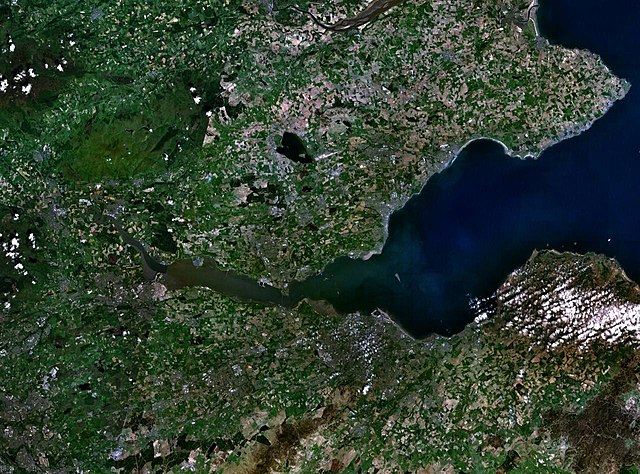Robert Henryson was a poet who flourished in Scotland in the period c. 1460–1500. Counted among the Scots makars, he lived in the royal burgh of Dunfermline and is a distinctive voice in the Northern Renaissance at a time when the culture was on a cusp between medieval and renaissance sensibilities. Little is known of his life, but evidence suggests that he was a teacher who had training in law and the humanities, that he had a connection with Dunfermline Abbey and that he may also have been associated for a period with Glasgow University. His poetry was composed in Middle Scots at a time when this was the state language. His writing consists mainly of narrative works. His surviving body of work amounts to almost 5000 lines.
The Firth of Forth which separates Fife (north) and the Lothians (south). Dunfermline is close to the principal crossing point on the Fife side.
The west door of Dunfermline Abbey.
Figure in Abbot House which purports to imagine Henryson; more strictly speaking, the image depicts Aesop as portrayed in Henryson's Morall Fabillis
Dunfermline Abbey from a 17th-century engraving which gives a more complete impression of the original building complex than survives today.
Scots is an Anglic language variety in the West Germanic language family, spoken in Scotland and parts of Ulster in the north of Ireland. Most commonly spoken in the Scottish Lowlands, Northern Isles, and northern Ulster, it is sometimes called Lowland Scots to distinguish it from Scottish Gaelic, the Goidelic Celtic language that was historically restricted to most of the Scottish Highlands, the Hebrides, and Galloway after the sixteenth century; or Broad Scots to distinguish it from Scottish Standard English. Modern Scots is a sister language of Modern English, as the two diverged independently from the same source: Early Middle English (1100–1300).
Statue of Robert Burns in Canberra, Australia
Lufe God abufe al and yi nychtbour as yi self ("Love God above all and thy neighbour as thyself"), an example of Early Scots, on John Knox House, Edinburgh
William Wye Smith's The New Testament in Braid Scots







